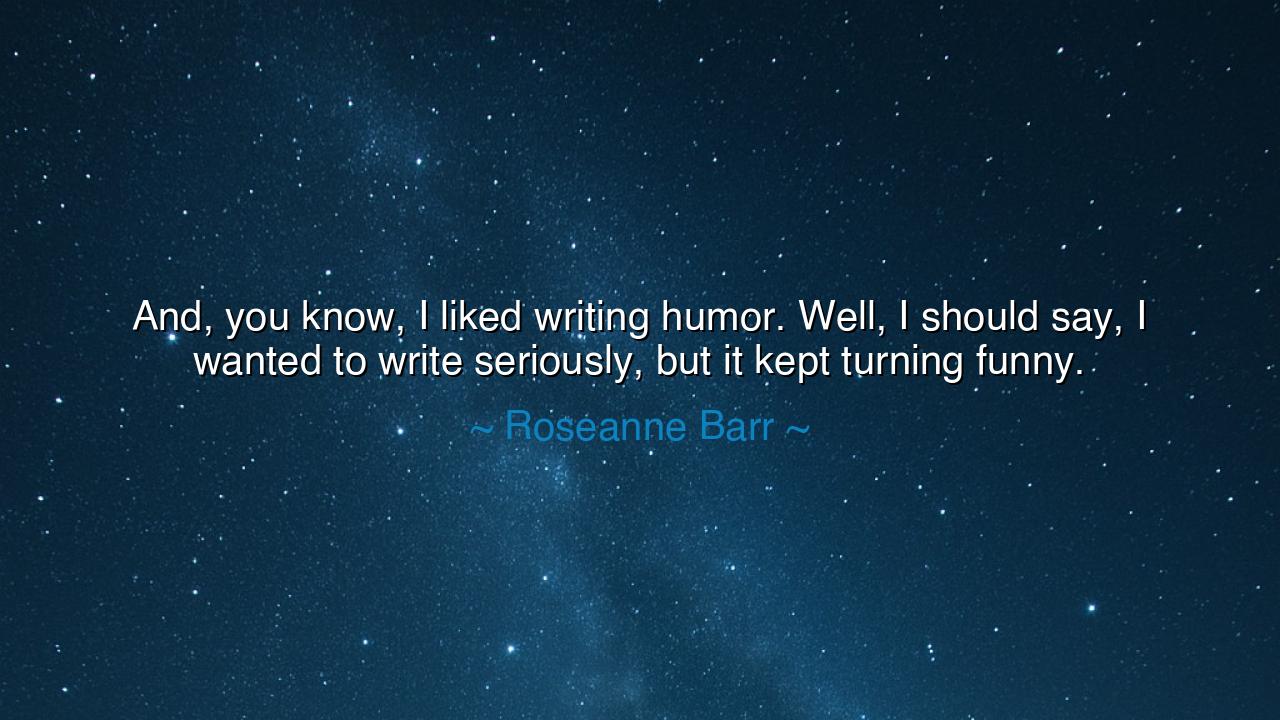
And, you know, I liked writing humor. Well, I should say, I
And, you know, I liked writing humor. Well, I should say, I wanted to write seriously, but it kept turning funny.






In the words of Roseanne Barr, “And, you know, I liked writing humor. Well, I should say, I wanted to write seriously, but it kept turning funny.” These words, humble yet profound, reveal a secret known to the greatest storytellers since the dawn of time — that humor is not the opposite of seriousness, but its twin, born from the same womb of truth. Roseanne speaks as one who tried to walk the solemn road, only to find that laughter met her at every turn. Her struggle was not failure; it was revelation. For life itself, when seen clearly, is both tragedy and comedy, and the soul that can transform pain into laughter possesses a rare and sacred power.
In this confession lies the heart of the comic spirit — that mysterious force that arises not from mockery, but from honesty. To want to “write seriously” is to confront the world’s sorrows, injustices, and absurdities. Yet when Roseanne’s pen touched the page, her truth came forth laughing. It was not by intention, but by nature. The human experience, when faced without pretense, often becomes funny — not because it is shallow, but because it is unbearably deep. Humor, in this sense, is the soul’s way of bearing the unbearable. It is the laugh that keeps the heart from breaking, the spark of creation that redeems suffering through wit.
The ancients knew this truth well. In the old theaters of Athens, before the days of marble philosophers, the people gathered to watch both tragedy and comedy, and they understood that one could not live without the other. The tragedies taught men how to suffer nobly, while the comedies taught them how to survive. The playwright Aristophanes mocked the very gods, yet beneath his laughter flowed the wisdom of a people who had seen war, famine, and folly. He laughed not because he took life lightly, but because he took it so seriously that he could see its madness. Roseanne’s journey echoes his — her humor sprang not from levity, but from a deep confrontation with the ordinary struggles of family, work, and identity. She sought solemnity and found laughter instead, because truth, when spoken plainly, so often reveals its own absurd beauty.
In her story, we find a paradox that defines all true artistry. The artist may set out to craft wisdom, to speak of sorrow, to reveal the wounds of existence — but if the artist is honest, those wounds will shine with laughter, for they are the marks of being human. When Roseanne’s “serious” words turned funny, it was the world itself speaking back to her, saying, “Even in your grief, there is grace.” Her gift was not in controlling her art, but in surrendering to it — in allowing the humor that lived within her to rise like spring water from the stones of struggle.
Think of Charlie Chaplin, who once said, “Life is a tragedy when seen in close-up, but a comedy in long-shot.” He, too, wanted to speak seriously — to expose poverty, loneliness, and oppression — but his body, his face, his very being, turned it into laughter. Through his humor, he touched the divine. Chaplin, like Barr, taught that the highest form of seriousness is not solemnity, but compassion — the ability to make others laugh while reminding them of their humanity. Humor, in its truest form, is mercy given shape and sound.
Thus, Roseanne’s words remind us of a profound truth: that to be human is to live between laughter and lament, and that both serve the same master — the search for meaning. If your work, your speech, or your heart “turns funny” when you try to be serious, do not fight it. It is not a flaw; it is the voice of resilience within you. To find humor in struggle is to affirm life itself. The wise know that laughter is not the enemy of seriousness; it is its companion, its echo, its secret strength.
Let this be the lesson for all who seek to create or to live deeply: do not fear the laughter that rises in dark places. When your words turn funny against your will, know that the truth is speaking through you. Embrace it. Laugh with tenderness, not with scorn. Write, speak, and live so honestly that your sincerity bursts into joy. For the one who can find humor in the act of being human is not shallow, but strong — not foolish, but free.
And so, dear listener, remember Roseanne Barr’s wisdom: “I wanted to write seriously, but it kept turning funny.” For this is not a failure of control — it is the triumph of the spirit. When life insists on laughing through your sorrow, let it. For laughter is the soul’s rebellion against despair, and in that laughter, we discover the deepest seriousness of all — that joy, like truth, cannot be silenced.






AAdministratorAdministrator
Welcome, honored guests. Please leave a comment, we will respond soon